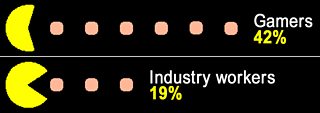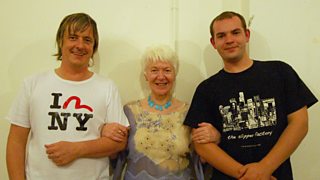вҖҳMaking video games isnвҖҷt just for boysвҖҷ вҖ” a 7-year-old girl investigates gender imbalance in the gaming industry
2 July 2018

In the United Kingdom, the proportion of women who work in the computer games industry is less than half the proportion who play the games.
Dr Matthew Barr, a games researcher from University of Glasgow, described this gender imbalance as “something to be concerned about.”
“It would be nice to have an industry where my daughter was just as likely to get a job as anyone else.”
At a games exhibition in Glasgow, his seven-year-old daughter Eva learnt how people are beginning to challenge this gender disparity.

Why are there so few female game developers?
Dr Matthew Barr and daughter Eva investigate why so few women work in the games industry.
Dr Barr agreed that changes in the games industry have brought a lot of joy to people over the last 40 years.
From the simplistic nature of Pong to the hyper-realistic titles of today, video games have become one of the biggest forms of entertainment.
The boom in gaming has also resulted in creative hubs appearing throughout Scotland, with around 1,500 people employed in an industry that raised around £71m worth of tax revenue last year.
Eva’s knowledgeable appreciation for gaming, coupled with a passion for learning why there aren’t as many women as men working in the computer games industry, led her to someone in the know who could tell her more.
Games producer Melissa Knox

A more diverse work force means more diverse gamesMelissa Knox, Producer
Melissa Knox is a producer at Blazing Griffin, a company that started out making video games but has since diversified into making films and creating post-production graphics.
Agreeing with Eva that video games are not just for boys, Melissa added that “having a more diverse workforce means you can make a more diverse set of games.”
One of Melissa’s roles as a producer is to encourage young people, specifically women, to get into .
The games industry needs people with a breadth of knowledge, not just computer programming.

-
![]()
Women have made many valuable contributions to computer science.
-
![]()
Why is Russia so good at encouraging women into tech?
Stem subjects have an image problem, but not in Russia.
-
![]()
Why tech needs a makeover to attract young women
Women have long been very under-represented in technology.
-
![]()
Dream Job: Anne-Marie Imafidon
SheвҖҷs the eldest child in what was once called вҖҳBritainвҖҷs Brainiest FamilyвҖҷ.
Latest features from ҙуПуҙ«ГҪ Scotland
-
![]()
'Wild swimming helps me process the grief of losing my son'
The benefits of cold water therapy.
-
![]()
Winter adventures are appealing, but an expert advises caution
Trips in winter require particular knowledge and skills.
-
![]()
The rescuers: Why volunteers risk their lives in mountain emergencies
Landward meets members of the Cairngorm Mountain Rescue Team.
-
![]()
вҖҳLook for the lightвҖҷ вҖ“ practical tips to help you through another winter with SAD
Useful advice and tips to combat low moods at this time of year.
-
![]()
How you could be a binge drinker without even knowing
Binge drinking is classed as fewer units than many people may realise.
-
![]()
How chocolate biscuits and drama classes helped one man leave prison behind
The healing power of creativity.
-
![]()
'When people believe in you, itвҖҷs life-changing'
Author Graeme Armstrong revisits the man who helped turn his life around.
-
![]()
The 'breath-taking' display of US birds swept on to British soil
Recent storms have brought rare birds to our shores.
-
![]()
Six things we learned about Alan Cumming on Take the Floor (Spoiler: includes accordions)
The actor spoke to Take the Floor's Gary Innes.
-
![]()
How street gangs trap young men in a dangerous cycle of violence
The almost inescapable pull of life in a gang.
-
![]()
Why stylist Gok Wan believes there's no such thing as bad fashion
The fashion expert says we should stop following rules and do what feels right.
-
![]()
Is sending a CV still the right way to apply for a job?
They've been central to job applications for years, but are they worth it?




















